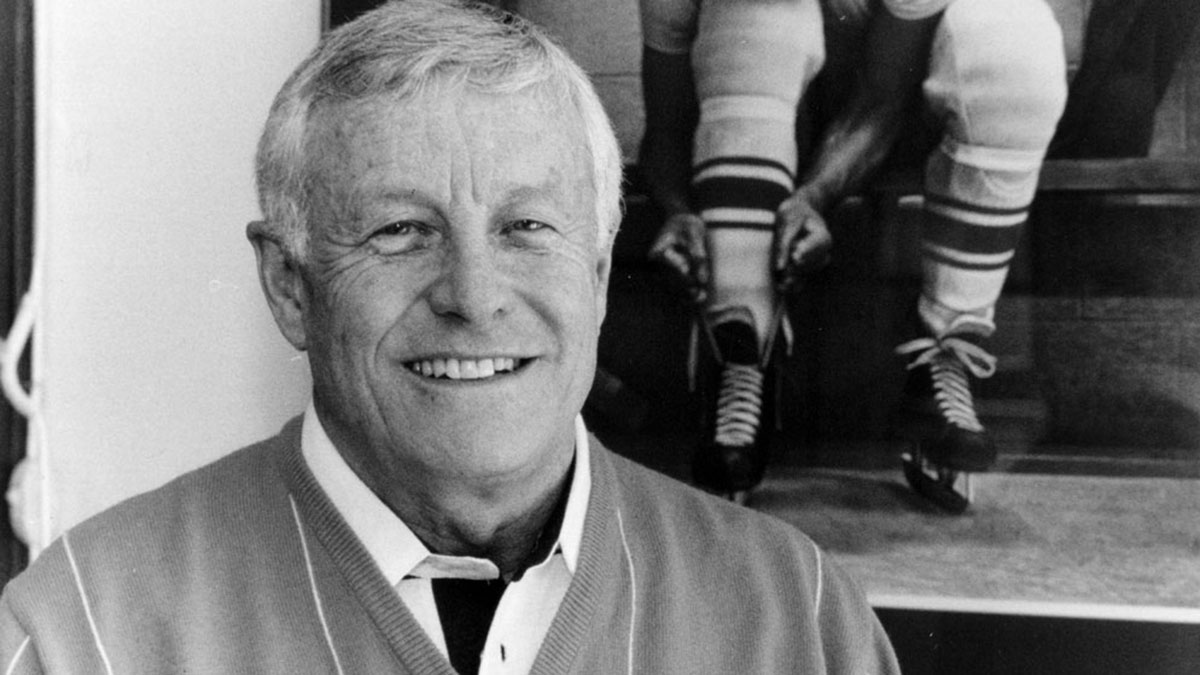U of A honours coaching legend Clare Drake
 Supplied
SuppliedIf any University of Alberta Athletics alumnus deserves to be honoured for their accomplishments, it’s Clare Drake.
On June 13, the University of Alberta did just that, hosting a dinner to recognize the career and accomplishments of the former Golden Bears hockey coach.
Drake coached The Bears for 28 seasons, winning 17 Canada West Conference championships, and six University cup championships.Drake also accomplished something that no other university coach has – he won both a hockey and football championship in the same year, accomplishing the feat in 1967. Long story short, there’s a reason the arena is named after him.
His ability to consistently field competitive teams throughout his university coaching career hasn’t gone unnoticed around the hockey community.
“The biggest thing is his passion,” Golden Bears head coach Ian Herbers remarked. “If he didn’t have passion for the game and for the people involved, he wouldn’t have lasted as long as he did.”
Golden Bears General Manager Stan Marple echoed Herbers’ sentiments stating that Drake had an innate ability to get the most out of his players.
“From my point of view, the passion is paramount, but I also think it comes down to his ability to coach, his ability to get the most out of his players, and to earn their respect and their trust.” He said.
Pandas Hockey Head Coach Howie Draper knows Drake’s career and accomplishments as well as anyone – and for good reason. He wrote his master’s thesis on Drake himself.
“He was a tremendous influence in my life, and I guess what I really wanted to find out was “why?” How did he have such a tremendous impact on me and so many others. did he intend to do that, or was it something that just kind of came naturally,” Draper said, speaking about his decision to write his masters on Drake. “Eventually, I just focused on his leadership, and how that contributed to helping so many hockey players really learn to be the best they could be.”
Draper spoke about the achievement, and how Drake was an excellent motivator of players, no matter the sport.
“I think his biggest strength was the fact that he was a value oriented coach,” Draper said. “He taught what was important and what wasn’t important, and when you can get people to buy into those values and become better people as a result, then they understand what they need to do in order to become better athletes.”
Drake left a legacy that is still remembered today, and his example is one that current University of Alberta coaches still try to emulate.
“He was very much an educator as well as a coach,” remarked Ian Reade, head of the University of Alberta athletics program. “I think that’s something that all of our coaches try to maintain to an extent, and something we believe in.”
“In spite of all the success he had as a coach, the most important thing was the process, and the way that he did it,” Marple said.
“He made his players better players, but also better people, and taught the core values that our program was founded on, and all the coaches that followed him had a great template for success within the organization.”
Herbers agreed and also spoke about how Drake was always looking for new methods in order to be successful.
“He was a teacher, a motivator, and an innovator, and was never happy with the status quo,” Herbers said. “He was always pushing, trying to find new ways to do things, and ways to make the game better, not just U of A hockey, but hockey in general.
“The template was there and I used it, and if you look at all the successful coaches that have come from this program, it’s a real testament to legacy that Coach Drake left.”
Herbers is on the path to creating his own legacy at the U of A. In his three years as the head coach of the Bears hockey team, he’s made it to the CIS Championships three times and won twice.




